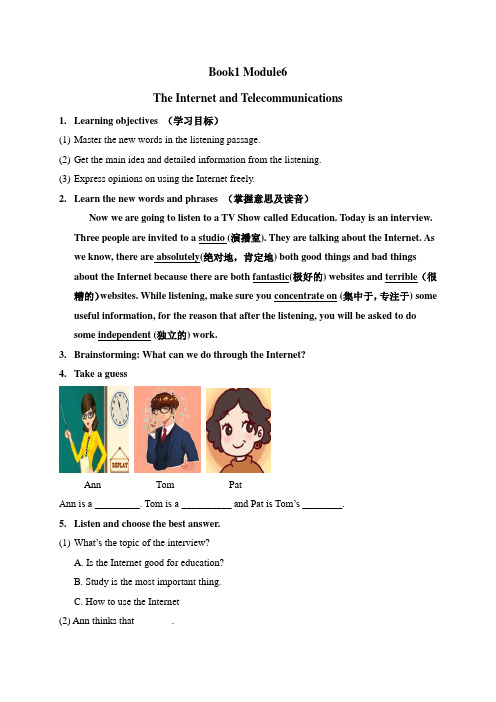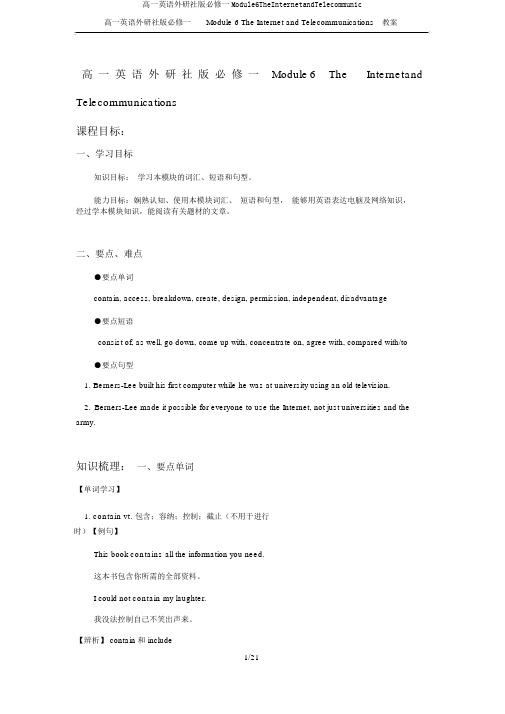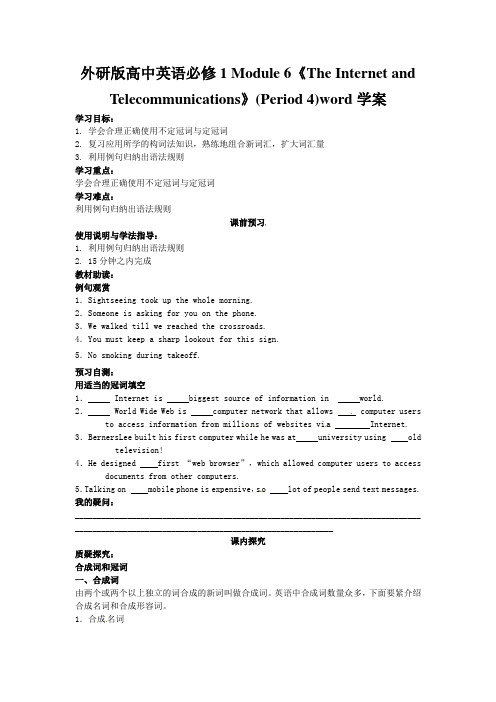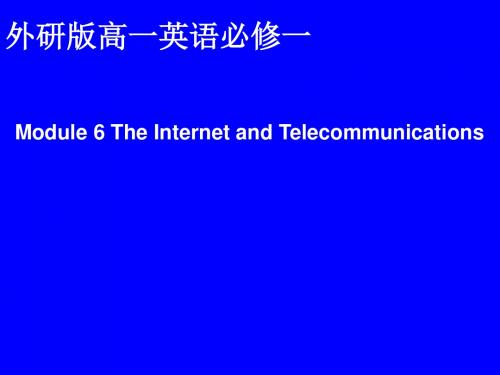海南省文昌华侨中学高一英语外研版必修1《module6theinternetandtelecommunications》教案
海南省文昌华侨中学高一英语外研版必修1《module6theinternetandtelecommunications》学案

Book1 Module6The Internet and Telecommunications1.Learning objectives (学习目标)(1)Master the new words in the listening passage.(2)Get the main idea and detailed information from the listening.(3)Express opinions on using the Internet freely.2.Learn the new words and phrases (掌握意思及读音)Now we are going to listen to a TV Show called Education. Today is an interview.Three people are invited to a studio (演播室). They are talking about the Internet. As we know, there are absolutely(绝对地,肯定地) both good things and bad things about the Internet because there are both fantastic(极好的) websites and terrible(很糟的)websites. While listening, make sure you concentrate on (集中于,专注于) some useful information, for the reason that after the listening, you will be asked to do some independent (独立的) work.3.Brainstorming: What can we do through the Internet?4.Take a guessAnn Tom PatAnn is a _________. Tom is a __________ and Pat is Tom’s ________.5.Listen and choose the best answer.(1)What’s the topic of the interview?A. Is the Internet good for education?B. Study is the most important thing.C. How to use the Internet(2) Ann thinks that _______.A. everything on the Internet is useful for studentsB. the Internet is a bad thingC. it’s important to help students find useful sites on the Internet(3) Tom thinks that _______.A. the Internet is the only place to studyB. the Internet is a good place to studyC. it’s important to use the Internet as much as possible(4) Pat thinks that ______.A. Tom should only study from booksB. Tom spends too much time reading about football on the InternetC. using the Internet is a bad thing6. Listen and decide if the following statements are True or False.(1) Ann, the teacher, thinks that we should concentrate on the bad things about the Internet.(2) The Internet has useful information about all kinds of things.(3) Students are encouraged to use the Internet during school time.(4) Tom spends five hours on the Internet per week.(5) Tom’s mot her doesn't allow Tom to use the Internet.7. Listen and do the blank-filling.Ann Tom PatThere are good and bad things about the Internet. For one thing, the Internet has _______ information about all kinds of things, so it’s good for students to use it. For another thing, we all know that there are some_________ sites on the Internet. We must make sure that students look for information on It’s ______to study onthe Internet,which is_______fromstudying atschool. I likestudying atschoolThere are a lot of musicsites that he likes. And hespends a lot of time______ about his favoritefootball team. I want himto study and ______himself. But studying isimportant. And studyingfrom the books is_________.interesting and ________ sites._________.8. Do a survey in your group and report it to the class.How many people in your group think that the Internet is an angel or a demon? Why? *Useful words/phrases/sentence patternsfantastic adj. 极好的terrible adj. 糟糕的trap n. 陷阱junk information 垃圾信息save money and time 省钱和时间be good for 对…有好处be bad for 对…有害become addicted to 对…上瘾be cheated 被欺骗relax oneself 放松自己communicate with 与…交流concentrate on 专注于spend time on sth/in doing sth 花时间为(做)某事It’s adj to do sth. 做…怎么样One possible version:In our group, there are ____ people who agree that the Internet is an angel. The reasons are as follows. First,______. Second,_______. Third, _______.However, the rest disagree with them. They say that ______. Besides, ______.That’s all. Thank you.9. Discussion: If we don’t have the Internet, w hat else can we do?10. Homework(1) Review the vocabulary we’ve learned(2) Write down the result of your survey within 100 words。
外研版高中英语必修1 Module 6《The Internet and Telecommunica

外研版高中英语必修1 Module 6《The Internet and Telecommunications》(Period 3)word学案学习目标:1. 把握文章中包含的重要语言点2. 培养快速阅读,整体明白得能力3. 了解网络的进展过程及现状学习重点:把握文章中包含的重要语言点学习难点:培养快速阅读,整体明白得能力课前预习使用说明与学法指导:1. 在语境中把握重点单词、短语和句型的用法2. 15分钟之内完成教材助读:1. Their designs are Hawaiian themes created by Daphne.2. Some of them may want to concentrate on even more specific s port activities like ball games,gymnasium,swimming,etc.3. Last December,some new smart phones which contain an NFC chip were introduced to the public.4.I don’t have the apple and I’m feeling miserable as well.5. Dinners usually consist of meat or fish with vegetables followed by dessert,fruit and coffee.预习自测:选词填空access, defend, create, design, permit, concentrate, advantage, consist, invention1.This kind of stamp is ________ by some students who are learning art at our university.2.The town walls were built as a ________ against enemy attacks.3.You need ________ from the World Wide Web before you can access information. 4.Computers should be made readily ________ to teachers and pupils.5.It is said that the band ________ of 4 members appealed to all the college students. 6.One of the main ________of this system is that it uses very small amounts of fue l. 7.That is his ________ designs for the new college building.8.I lost my ________ and nearly drove into a bridge.我的疑问:_______________________________________________________________________________ ___________________________________________________________课内探究质疑探究:1错误!贝尔纳斯·李使得每个人用因特网成为了可能,而不仅仅是大学院校和军队。
高一英语外研社版必修一Module6TheInternetandTelecommunic

高一英语外研社版必修一Module 6 The Internet and Telecommunications教案高一英语外研社版必修一Module 6 The Internet a nd Telecommunications课程目标:一、学习目标知识目标:学习本模块的词汇、短语和句型。
能力目标:娴熟认知、使用本模块词汇、短语和句型,能够用英语表达电脑及网络知识,经过学本模块知识,能阅读有关题材的文章。
二、要点、难点●要点单词contain, access, breakdown, create, design, permission, independent, disadvantage●要点短语consist of, as well, go down, come up with, concentrate on, agree with, compared with/to●要点句型1.Berners-Lee built his first computer while he was at university using an old television.2.Berners-Lee made it possible for everyone to use the Internet, not just universities and the army.知识梳理:一、要点单词【单词学习】1.contain vt. 包含;容纳;控制;截止(不用于进行时)【例句】This book contains all the information you need.这本书包含你所需的全部资料。
I could not contain my laughter.我没法控制自己不笑出声来。
【辨析】 contain 和 include1)contain 往常用来指某种容器中盛有某物,还指某种物质中含有某成分或含有其余物质。
外研版高中英语必修1《module 6 the internet and telecommunica

词in连用,表示在从事某项活动,也不用冠词.
go to school / in schoolgo to hospital / in hospital
go to class / in classgo to bed / in bed
注意:在以上词组中假如使用冠词,则表示到某个地点去或在某个地点.
外研版高中英语必修1《module 6 the internet and telecommunications》word学案(5)
总第课时第5课时中心备课人授课时刻授课人
教学目标及达成
Master the basic usages of thedefinitearticle .
To enable the students to knowthe usage of zero article
First read the grammar, then explain and exercise.
教学重点
Enable the students to knowthe usage of definite article
教学难点.
Get the Ss to know the usห้องสมุดไป่ตู้ge of thearticle.
注意:序数词表示“又一”时,前面用不定冠词a/an。
He bought a second pair of shoes.他又买了一双鞋。
3.用在乐器名词前,表示演奏She can play the piano/violin/guitar.
4.用在江河,海洋,湖泊,群岛,山脉的名称前
the Yangtze River长江;the West Lake西湖;the Pacific太平洋;the Rocky Mountains落基山脉
外研版高中英语必修1 Module 6《The Internet and Telecommunica

外研版高中英语必修1 Module 6《The Internet and Telecommunications》(Period 4)word学案学习目标:1. 学会合理正确使用不定冠词与定冠词2. 复习应用所学的构词法知识,熟练地组合新词汇,扩大词汇量3. 利用例句归纳出语法规则学习重点:学会合理正确使用不定冠词与定冠词学习难点:利用例句归纳出语法规则课前预习使用说明与学法指导:1. 利用例句归纳出语法规则2. 15分钟之内完成教材助读:例句观赏1.Sightseeing took up the whole morning.2.Someone is asking for you on the phone.3.We walked till we reached the crossroads.4.You must keep a sharp lookout for this sign.5.No smoking during takeoff.预习自测:用适当的冠词填空1. Internet is biggest source of information in world.2. World Wide Web is computer network that allows computer users to access information from millio ns of websites vi a Internet. 3.BernersLee built his first computer while he was at university using old television!4.He designed first “web browser”,which allowed computer users to access documents from other computers.5.Talking on mobile phone is expensive,s o lot of people send text messages. 我的疑问:_______________________________________________________________________________ ___________________________________________________________课内探究质疑探究:合成词和冠词一、合成词由两个或两个以上独立的词合成的新词叫做合成词。
外研版高一英语必修一《Module 6 The Internet and Telecommunications》课件

developed
SKILL:Read the first sentence and the last sentence of each paragraph.
3.Affective aim:To learn to use expressions to express their own ideas and take advantage of the Internet properly
Step 2 Fast Reading
Q:What’s the main idea of the passage?
Step 2 Fast Reading
Read the passage quickly and match the main ideas with the
paragraphs.
Para.1( F ) A.The inventor of the World Wide Web Para.2( D ) B.The development of the Internet Para.3( E ) C.The current condition of Berners-Lee Para.4( A ) D.The start of the Internet Para.5( B ) E.The definition of the World Wide Web
Байду номын сангаас
Step 3 Careful Reading
What’s the WWW?
It’s short __f_or__ the World Wide Web _w_h_ic_h_ is a computer network __th_a_t_ allows computer users to __a_cc_e_s_s _ information from millions of websites _v_i_a_ the Internet.
外研版高中英语必修1《module 6 the internet and telecommunica
教学重点
understand the new words and the listening passage
教学难点.
How to show opposite opinions and their own opinion.
教学方法(教具)
Read , listen, discuss,teach
教学过程
备课
பைடு நூலகம்札记
教师活动
学生活动
Step1. Lead-in
Talk about the Internet or other telecommunications.
T: What do you think of the Internet? Do you know your teachers’and parents’opinions?Ss: Free talk.
(Considertwo points: the danger of using only the Internetandspending too much time looking at a computer/the good of going to school─the importance of having a teacher andworking together as a class.)
2.Listening:Ss listen to the interview with questions:
1)How many people are being interviewed in the studio?
2)What do they concentrate on, good or bad things ofInternet?
外研版高中英语必修1Module6外研版必修1Module 6 The Internet and Telecommuniation教案
Module 6 The Internet and Telecommunications Ⅰ. 模块教学目标Ⅱ. 目标语言Ⅲ. 教材分析与教材重组1. 教材分析本模块以Internet and Telecommunications 为话题,不仅要求学生了解有关电脑、网络、电信的词汇,而且要了解因特网的历史和电信业的迅猛发展及因特网在现代交际中的作用。
从情感上来讲,要求学生能正确地、客观地、辩证地看待因特网和现代通讯设备,积极利用因特网获取信息,使因特网能够更好地服务于自己的生活。
从语言知识上来讲,教师应帮助学生复习应用所学的构词法知识,熟练地组合新词汇,扩大词汇量。
从阅读角度来讲,要学会从文中获取信息,加工信息和准确筛选信息。
从写作角度来讲,利用本模块所学的词汇和短语,结合实际陈述自己对因特网的看法和意见,并学会如何陈述相反的观点。
在WORKBOOK 中要求对学校的设施做简单的介绍,并且对需要改进的地方提出自己的看法。
1.1 INTRODUCTION通过一幅电脑图片,要求学生说出并掌握电脑各部件的名称,学会用简单的英语来解释这些英语单词。
同时给出了许多新词汇,学生根据不同的语境来选择词义,为以后的阅读奠定基础。
1.2 READING AND VOCABULARY课文分六段三部分。
分别介绍了因特网、因特网的兴起、万维网和万维网的发明。
通过学习本文,学生可以了解到关于因特网和万维网的知识。
课后设置了正误判断题和选择题,旨在让学生从文中获取信息并能准确理解文章内容,同时帮助学生进一步巩固和掌握新词汇。
1.3 GRAMMAR1部分介绍了构词法知识——合成词的构成。
要求学生了解合成词的三种构成方式,并通过相关的练习学会运用名词的构成法猜测新词的意思。
1.4 LISTENING AND VOCABULARY通过一段采访录音,培养学生准确获取听力材料中有效信息的能力。
要求学生正确理解对话内容并推断不同说话者的观点和态度。
外研版高中英语Book 1 Module 6 The Internet and Telecommun
Careful reading 2--Answer the question.
Did the universities start using the Internet at the same time as the army? If not, which earlier? No, they didn’t. The army started earlier.
Berners-Lee invented the world wide web
3.What is the World Wide Web? The World Wide Web is a computer network that allows computer users to access information from millions of websites via the Internet. 4. Who invented it? Tim Berners--Lee.
Careful reading 1-- True or false
1. The US army were the first people to use a network of computers. ( T ) 2. The percentage of websites in English is going up. ( F ) 3. Tim Berners-Lee built his first computer while he was at university. (T ) 4. Tim Berners-Lee made a lot of money from his invention. ( F )
Look at the picture and talk about Bill Gates with your classmates.
外研版必修一高中英语教案Module6TheInternetandTelecommunication
外研版必修一高中英语教案Module6TheInternetandTelecommunica tionsTeachingplanModule 6 The Internet and Telecommunication课题教学目的重点 难点 学情剖析 教具课件 教法教学顺序Step 1课时 1 教案Module 6 The Internet and Telecommunication Introduction & 课型NewReading1. Enable the Ss to talk about the Internet and the World Wide Web.2. Master some phrases about Internet and World Wide Web.3. Enable the Ss to learn to talk about the Internet and the World Wide Web.Learn the development of the Internet, the World Wide Web and the text massages and emoticons.Help the Ss to talk about the Internet and Telecommunications.The Ss can finish the task.1. A recorder 2. A projector 3. A computer1. Look at some pictures to learn some new words. 2. Individual, pair or group work to make every student work in class.教学内容〔引入、例题、练习题、检测题等〕师生 活动Lead-in1. Look at some pictures and guess what they are doing.时间 分配 10’net & websource & dataThe Internet is the biggest source of information in the world and it’s accessible through acomputer.2. Look at some pictures and learn some new words about chemistry.Look & sayStep 2Tim Berners-LeeStep 3In 1991, he invented the World Wide Web. Everyone in the world can access the Internet using his World Wide Web system.Fast Reading8’1) 〝 Who 〞 developed a way for computers to 〝 talk 〞 to each other through thetelephone?Step 4DARPA, a US defence organization.2) Who made it possible for everyone to use the Internet? Tim Berners-Lee3) Has the Internet created thousands of millionaires? Yes, it has.Detail reading26’1. Para 1 Decide if these sentences are true.1) There are millions of pages of information on the Internet. ( T )2) The US army were the first people who used an Internet system. ( T )3) Universities started using the Internet at the same time as the army. ( F )4) The percentage of websites in English is getting smaller. ( T )5) Tim Berners-Lee made it possible for scientists to use the Internet. ( T )6) He has made a lot of money from his invention. ( F ) 2. Language points 1) The Internet is the biggest source of information in the world, and it’s accessible through a computer. (1) accessible 可接近的,可进入的,常用于 accessible to sb/ sthRead & lear nOur headmaster is accessible to the students. get/ gain/ have (no) access to sth 没有失掉/取得/拥有某物的时机和权益Only high officials had access to the president. 只要初级官员才无时机接近总统。
- 1、下载文档前请自行甄别文档内容的完整性,平台不提供额外的编辑、内容补充、找答案等附加服务。
- 2、"仅部分预览"的文档,不可在线预览部分如存在完整性等问题,可反馈申请退款(可完整预览的文档不适用该条件!)。
- 3、如文档侵犯您的权益,请联系客服反馈,我们会尽快为您处理(人工客服工作时间:9:00-18:30)。
Book1 Module6
The Internet and Telecommunications
教学设计
1.Teaching objectives:
By the end of the class, most of the students are able to:
☞ Knowledge objective:
master the main vocabulary and phrases in the listening passage
☞ Ability objectives:
(1)develop listening skills: prediction, listening for gist, listening for details
(2)use what they’ve learned to express their opinions on the Internet
☞ Emotional objective: enhance the awareness of using the Internet properly 2.Important points
(1)Master the main vocabulary and phrases in the listening passage.
(2)Develop listening skills
(3)Express their opinions on using the Internet freely.
3.Difficult points
Use what they’ve learned to talk about their own views about the Internet and make a report about the result of the group’s survey
4.Teaching procedures and time allotment
Steps Activities Purpose
To lead in the topic Step1 Pre-listening 1.Students will be
asked to think what
they can do through
the Internet.)
(2mins)
2.Students will learn To help students learn
the new words and phrases as the teacher show them through a passage. (3mins)the new words in context.
3.Students will take a
guess about the
identity of the three
interviewees.
(2mins)To help students pave the way of listening
Step2 While-listening 1.Students will listen
for the first time and
do the multiple
choice. (3mins)To help students get the main idea of the listening
2.Students will listen
for the second time
and decide if the
statements are true
or false. (3mins)To help students get the specific information of the listening
3.Students will listen
for the third time
and do the
blank-filling.
(4mins)To help students get some detailed information and review some useful expressions to pave the way of speaking
Step3 Post-listening 1.Students will be
asked to do a survey
in their own group to
find out how many To help students learn to talk about their views on the Internet and practice the skill of
people in their group
agree that the
Internet is an angel
or a demon and
collect the reasons
for it. Then each
group will have one representative to
report the result to
the class. (15mins)
speaking
2.Students will be
asked to think that if
they don’t have the
Internet, what else
they can do. (2 mins) To sum up the class and help students learn to appreciate the happy life they have now
Assignments Students will be asked to
review the vocabulary
they’ve learnt and write
down the result of their
survey within 100
words. (1min) To help students consolidate what they have learnt today and practice writing。
